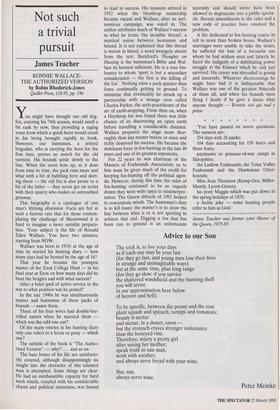Not such a trivial pursuit
James Teacher
RONNIE WALLACE: THE AUTHORIZED VERSION by Robin Rhoderick-Jones Quitter Press, £16.95, pp. 186 OU might have thought our old dog- fox, entering his 74th season, would smell a bit rank by now, thus providing a raging scent from which a quick burst would result in his being brought rapidly to book. However, our huntsman, a retired brigadier, who is carrying the horn for the first time, proves no match for the old varmint. His hounds settle slowly to the line. When the scent hots up, as it does from time to time, the pack runs mute and what with a bit of babbling here and skirt- ing there — the old fox is also prone to a bit of the latter — they never get on terms with their quarry who makes an untroubled getaway.
This biography is a catalogue of one man's lifelong obsession. Facts are fed at such a furious rate that for those contem- plating the challenge of Mastermind it is hard to imagine a more suitable prepara- tion. 'Your subject is the life of Ronald Eden Wallace. You have two minutes, starting from NOW: Wallace was born in 1919; at the age of nine he started his hunting diary — how many days had he hunted by the age of 16?
That year he became the youngest master of the Eton College Hunt — in his final year at Eton on how many days did he hunt the beagles and with what success?
After a brief spell of active service in the war to what position was he posted?
In the late 1940s he was simultaneously master and huntsman of three packs of hounds — name them.
Three of his four wives had double-bar- relled names when he married them — which was the odd one out?
Of the many entries in his hunting diary only one refers to a horse or pony — which one?
The subtitle of the book is "The Autho- rised Version" — why?'. . . and so on.
The bare bones of his life are satisfacto- rily covered, although disappointingly no insight into the character of this talented man is attempted. Some things are clear. He had an inexhaustible capacity for hard work which, coupled with his considerable charm and political astuteness, was bound to lead to success. His moment arrived in 1952 when the Heythrop mastership became vacant and Wallace, after an acri- monious campaign, was voted in. The author attributes much of Wallace's success to what he terms 'the invisible thread', a mystical union between huntsman and hound. It is not explained that this thread is woven in blood, a word strangely absent from the text. Beckford's Thoughts on Hunting is the huntsman's Bible and Wal- lace its keenest adherent. He is a true fox- hunter to whom 'sport is but a secondary consideration — the first is the killing of the fox'. Nothing ruins a pack quicker than foxes continually getting to ground. To minimise that eventuality he struck up a partnership with a strange cove called Charles Parker, the arch-practitioner of the art of earth-stopping. From then on, when a Heythrop fox was found there was little chance of its discovering an open earth before travelling a considerable distance. Wallace prepared the stage more thor- oughly than any master before or since and richly deserved his success. He became the dominant force in fox-hunting in the last 40 years and one of its greatest exponents.
For 22 years he was chairman of the Masters of Foxhounds Association, so to him must be given much of the credit for keeping fox-hunting off the political agen- da. However, during this time the rules of fox-hunting continued to be so vaguely drawn they were wide open to misinterpre- tation. The Quom debacle of 1991 helped to concentrate minds. The huntsman's duty is to kill foxes: the master's is to draw the line between what is or is not sporting to achieve that end. Digging a fox that has been run to ground is an unfortunate necessity and should never have been allowed to degenerate into a public specta- cle. Recent amendments to the rules and a new code of practice have resolved the problem.
A life dedicated to fox-hunting exacts its toll in more than broken bones. Wallace's marriages were unable to take the strain, he suffered the loss of a favourite son whom he had seldom seen and latterly he faced the indignity of a debilitating power struggle at the Exmoor which he only just survived. His career was shrouded in gossip and innuendo. Whatever shortcomings he might have had it is indisputable that Wallace was one of the greatest Nimrods of them all, and when his hounds were flying I doubt if he gave a damn what anyone thought — Ronnie soit qui mal y pense.
* * * * * * * * 'You have passed on seven questions. The answers are: 354 days with 26 packs; 104 days accounting for 150 hares and three foxes; paymaster to prisoner-of-war camps in Shropshire; the Ludlow Foxhounds; the Teme Valley Foxhounds and the Hawkstone Otter- hounds; Miss Jean Thornton (Kemp-Gee, Miller- Mundy, Lycett-Green); his pony Maggie which was put down in the spring holidays of 1929; a feeble joke — some hunting people refer to him as God.'
James Teacher was former joint Master of the Quom, 1975-83.


























































 Previous page
Previous page